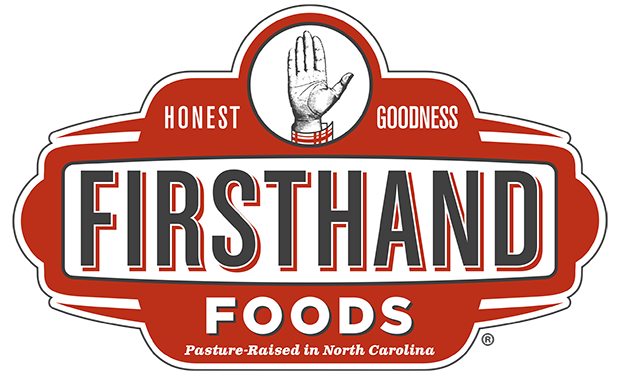When the Firsthand Foods’ team began to get serious about making bacon, we decided, due to popular demand, to offer a “nitrate free” product. We came up with a bacon brine that utilizes celery juice powder as a natural preservative instead of sodium nitrite. The bacon that resulted is delicious! And left us wanting to know more about exactly what’s going on with that celery powder. What are nitrites and is our bacon really nitrate or nitrite free? Here’s what we’ve figured out from our research:
What are nitrates and nitrites and what do they do?
Sodium nitrate and sodium nitrite are salts that are used in curing or preserving meat and fish. Sodium nitrate is a naturally occurring mineral that exists in lots of green vegetables, which we (optimistically!) consume all the time. Sodium nitrite is derived from sodium nitrate and is the compound that actually contains the antimicrobial properties that are desired in the production of bacon, hot dogs, salami, etc… In the case of salami, sodium nitrate is added during preparation and it then breaks down during the fermentation process into sodium nitrite, which helps prevent the growth of the deadly botulism bacteria. In the production of products like bacon, ham and hot dogs, which aren’t fermented, straight sodium nitrite is added. Besides preventing botulism, the presence of sodium nitrite provides the characteristic pink color and piquant “cured” flavor to these meat products.
Are nitrates and nitrites bad for you?
Yes and no. Turns out that nitrates exist in fairly large quantities in green vegetables. When we consume dietary nitrate our body converts it into nitrite, which increases nitric oxide in our blood stream and helps lower blood pressure. The stuff that’s actually bad for you is nitrosamine. This is created in the body when those green vegetables react with our acidic gastric juices. However, those vegetables also contain anti-oxidants, which keep nitrosamine production in check. Nitrosamines are also created when sodium nitrite is heated to a particularly high temperature. Nitrosamines have been linked in studies to cancer and so they are considered carcinogenic. Because of these studies, the USDA has imposed limits on the amount of sodium nitrite in cured meats and requires the addition of ascorbic acid (an antioxidant) in order to restrict the amount of nitrosamines that we consume. The other thing worth mentioning about these studies that link nitrosamines to cancer is the fact that a person eating enough bacon to ingest a dangerous amount of nitrite is eating, well, a lot of bacon. This equates to the consumption of a lot of meat, saturated fat and salt, in addition to sodium nitrite. If you are consuming traditional nitrite cured bacon, try to avoid burning it and be sure (surprise!) to maintain a balanced diet so that you’re eating antioxidant containing vegetables and/or fruits along with that bacon.
What’s up with celery powder in “nitrate free” bacon, ham, etc…?
As mentioned above, green vegetables contain nitrates. If you want to cure meat without the pure synthesized form of sodium nitrite, the naturally occurring nitrate in celery can be used. During the curing process, the nitrates in celery powder break down into nitrites and provide all the benefits of botulism prevention, bright pink color and that delicious cured flavor. For full disclosure, the USDA does not consider celery powder or any other “natural” form of nitrate to be a curing or preserving agent but rather a flavoring agent.
So are there nitrates or nitrites in there or what?
Our products can be legally and technically labeled “nitrate-free,” because the brine we use contains no synthesized sodium nitrite. It contains celery powder (and thus “naturally occurring sodium nitrite”), sea salt, cherry juice powder (ascorbic acid), maple sugar and some spices.
But to be completely transparent about it, due to the basic rules of chemistry, products that include celery powder do end up containing naturally-occurring nitrate and its derivative, sodium nitrite. We could choose to make our bacon without celery powder but it would be gray in color and, quite honestly, not as tasty. We’ve opted for striking a balance between flavor, appearance, and ingredients that speak to our customers’ interests in a more natural product.
When it comes to bacon, ham and cured meats, we believe in providing our customers with wholesome, high-quality products made from welfare-approved, pasture-raised animals sourced from local farmers. We encourage you to indulge in these specialty products in small quantities balanced with a good dose of seasonal fruits and vegetables.

